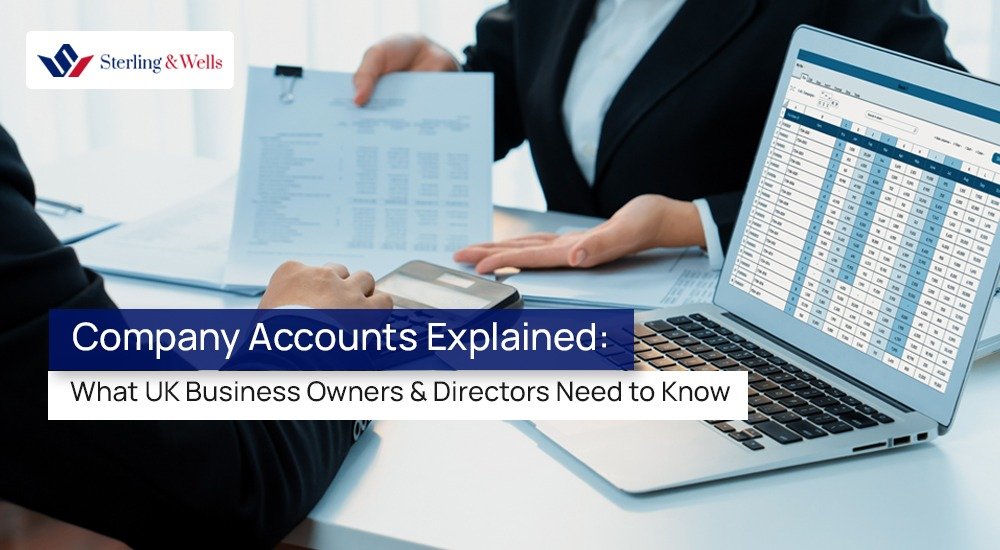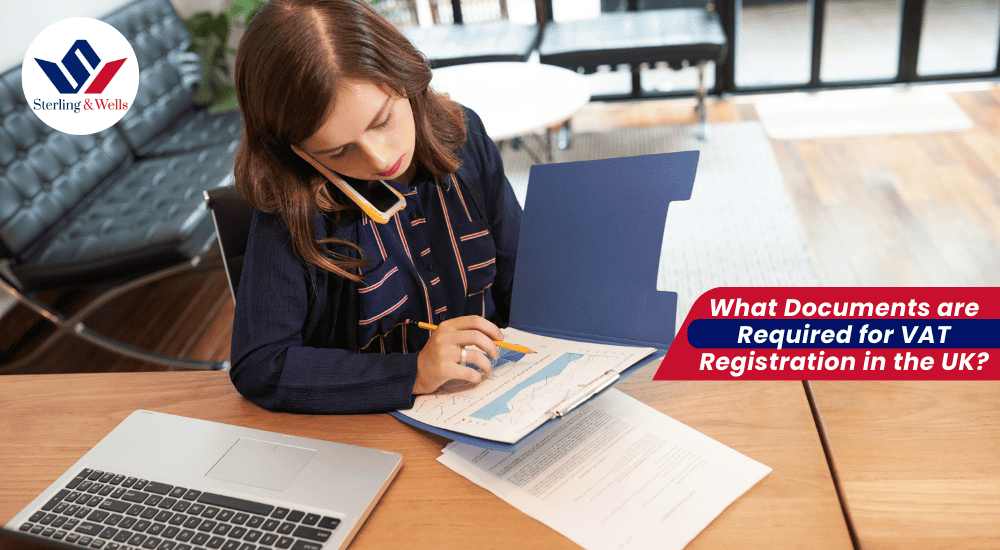Running a business in the UK involves more than just selling great products or offering good customer service. Behind the success of every business lies a single key administrative task: maintaining accurate, up-to-date company accounts. These accounts are not a luxury; these are legal requirements that also influence business performance, inform strategic decisions, and help maintain credibility with stakeholders.
For many directors, especially those without a background in finance, handling the accounts can seem pretty intimidating. But understanding them is crucial if the company wants to stay compliant, well-run, and investor ready. This guide will give you a clear explanation of how company accounts work, why they are important, and how different parts like bookkeeping, VAT, and payroll fit into the overall picture.
What Are Company Accounts?
Company accounts are formal financial statements that summarise the financial activity of a company over an average period of 12 months. Sometimes referred to as “statutory accounts,” they have to be submitted to Companies House and HM Revenue & Customs (HMRC). These reports are used to determine the amount of corporation tax to be paid as well as provide a snapshot of the company’s finances for public record.
It is important to note that they are not just about compliance and reflect the well-being, profitability, as well as the potential of the firm. They’re often reviewed by lenders, suppliers, and investors before contract negotiations, and are essential to maintain trust and honesty. Even for smaller businesses, simple and accurate accounts are essential in building credibility.
What's in Company Accounts?
Although the size and nature of the company might influence the level of detail, most UK company accounts contain several core features:
-
Balance Sheet
This is a summary of the company's financial position at the end of the latest fiscal year. It contains assets, liabilities, and equity, offering a look into what the firm owns versus what it owes
-
Profit & Loss Statement
Also known as the income statement, this shows the performance of the business for the year. It includes revenue, operating costs, and net profit or loss. This information is invaluable in tracking profitability and making sound management decisions.
-
Cash Flow Statement
In this, cash flow is recorded under three categories: operations, investments, and financing. This section helps in understanding how the business manages liquidity on a daily basis.
-
Notes to the Accounts
These are explanatory details offering more background to the numbers. They may cover tax provisions and accounting policies through to legal controversies or related-party transactions.
-
Director's Report
Required for all companies except micro-entities, this short report gives an overview of company performance, issues, and future strategic direction from the perspective of directors.
In some cases, a company may also be asked to include an auditor’s report, which gives external validation of the financial statements and can increase credibility with investors or lenders.
Who Must File Company Accounts?
Every UK company, regardless of size or level of trading, must submit accounts to Companies House annually. Even dormant or non-trading companies must do so. While accountants will normally prepare the technical paperwork, the legal responsibility is on the directors of the company. Not filing or filing with incorrect information can lead to penalties, court proceedings, or even a strike-off from the company register.
In order to reduce risk and ensure compliance, many companies are now using computerised filing systems or have accountants filing directly through secure software. Nevertheless, directors must continue to be actively involved, especially in the approval of final accounts prior to submission.
Special Rules for Smaller Companies
Not all firms are the same. UK legislation allows simplified reporting for “small companies” and “micro-entities” based on turnover, balance sheet size, and staff numbers. Such companies may prepare shortened or filleted accounts which omit some detail from the public record.
Small firms are also exempt from the compulsory audits, saving them money and administrative inconvenience. For this, however, you have to ensure that you’re eligible since filing the wrong type of account can cause delays or hefty penalty.
Bookkeeping: The Heart of Financial Precision
Behind every reliable set of company accounts is good bookkeeping. Bookkeeping is the routine process of recording all financial transactions, including earnings, outgoings, payments, and receipts. It ensures that all entries are accurate and backed by proper documentation like invoices and bank statements.

In the UK, there is a requirement for private companies to keep financial records for 3 years while public companies have to keep them for 6 years, respectively. Many experts suggest to keep records for up to six years, to align with HMRC’s audit timeframes. Updating records will help in filing accounts and answering tax questions with less stress.
The VAT Component of Company Accounts
Value Added Tax (VAT) is also a crucial part of financial management. From April 2024, businesses are required to register for VAT when their taxable turnover is above £90,000 in any one year. Once registered, they need to charge VAT, maintain digital records of VAT, and pay regular VAT returns under the Making Tax Digital (MTD) regulations.
For companies, especially those involved in e-commerce or foreign trade, VAT can be complicated. Issues like reverse charge mechanisms or exports to other countries usually require expert advice. Ensuring VAT accounts balance against company accounts can shield businesses from HMRC investigations or unexpected charges.
Payroll & Its Impact on Financial Reporting
If a business employs people, it will need to handle payroll through the PAYE (Pay As You Earn) system. This will include deducting income tax and National Insurance Contributions (NICs), reporting them to HMRC in real time via the RTI system, and running tasks such as pension auto-enrolment.
Payroll details are input into company accounts, and accuracy is thus crucial. Mistakes not only impact staff morale but can also lead to penalty fines. From the calculation of statutory sick pay to monitoring bonuses and benefits, adherence to payroll is an important aspect of the accounting process.
Company Accounts Filing Deadlines & Penalties
It is important to meet deadlines. Most private limited companies must send their accounts to Companies House within 9 months of their financial year-end. The corporation tax return, which is based on the same financial information, must reach HMRC within 12 months.
Late filing automatically attracts penalties, and the longer one waits, the more the penalties increase. Even if the task is outsourced to an accountant, directors are still held accountable. Cloud-based software and online calendars can also remind businesses of these key dates.
Adapting to Changing Reporting Standards
UK company accounts are required to meet the pre-determined accounting standards, which would most likely be UK GAAP or IFRS. FRS 102 defines UK Financial Reporting Standards that lay down the guidelines for what the accounts must include. The laws get updated every now and then, influencing the disclosure requirements as well as the accounting methods.
Directors must stay in touch with experts and professionals in order to stay aware of any changes. This is especially true for growing businesses or those in a highly regulated industry where the standards evolve more rapidly.
Handling International Trade & Cross-Border Accounts
For UK businesses that involve in international trade or have overseas subsidiaries, accounting can become very complex. There may be additional layers of reporting to reconcile transactions across currencies, jurisdictions, and tax systems.
These companies often benefit from tailor-made software and professional tax advice to ensure that reporting meets the necessary UK standards while reflecting the company’s foreign activities. It is also important to monitor the foreign exchange rates, which are capable of impacting profit margins and accounting reports significantly.
Common Issues & How to Stay Ahead
Many businesses find it hard to keep their accounts up to date, understanding the PAYE or VAT rules, and having more accounting processes as they grow. All these challenges can create stress at the end of the year or when responding to HMRC.
Solutions for these problems include investing in staff training, using cloud-based software, and having a strong relationship with an efficient accountant. Thinking of compliance as a year-round task, rather than a yearly scramble, can reduce long-term risks and helps improve overall efficiency.
Conclusion: Why Company Accounts Are More Than Just Paperwork
Company accounts aren’t just a legal requirement, they’re a business asset. Smart, timely accounts allow businesses to raise funds, measure performance, and make informed decisions. For directors, taking ownership of the accounts process is a sign of responsibility and professionalism.
With proper bookkeeping, payroll management, and VAT compliance, they turn from a chore into an asset. Its not just helpful with tax filing, but also for growth planning, investment opportunities, and maintaining the business in the long term.






